When it comes to human superfoods like blueberries, we might wonder: “Can capybaras eat blueberries?” Well, strap in, because we’re about to deep-dive into this fascinating subject.
If you’ve ever owned a capybara, or even if you’re just beginning the delightful journey of capybara parenthood, the primary concern on your radar is definitely your new family member’s diet.
There’s no denying it: Providing a rich and balanced diet is the backbone of your capybara’s health and happiness.
By the end of this comprehensive exploration, you’ll have a well-rounded understanding of whether blueberries hold a spot on your capybara’s menu.
The Nutritional Wealth of Blueberries
First things first, let’s get a grip on the power-packed nutritional profile of blueberries. Known as a superfood for humans, blueberries are rich in:
- Antioxidants, especially anthocyanins
- Dietary fiber
- Vitamin C and K
- Manganese
With such a potent nutrient composition, it’s tempting to think these little blue morsels must be beneficial for our capybara friends. But do these nutritional benefits translate well to our capybaras?
Let’s dive deeper.
The Dietary Peculiarities of Capybaras
Capybaras, the world’s largest rodents, are herbivores by nature. They thrive on a diet mainly consisting of grasses, aquatic plants, and sometimes fruits.
They have evolved to benefit from high-fiber diets, which are crucial for optimizing their digestion and overall health.
When equating a healthful and balanced capybara diet to that of our own, things can get a little fuzzy. So, while blueberries are amazing for us, are they just as great for capybaras?
Let’s explore that as well.
Potential Pros of Blueberries for Capybaras
After comprehending capybaras’ dietary needs, it’s reasonable to think that blueberries could be beneficial, considering the following potential positives:
- High Fiber Content: The high fiber content in blueberries aligns well with capybaras’ dietary needs, which suggests they may assist capybaras in maintaining a healthy digestive system.
- Rich in Antioxidants: We all know antioxidants are powerful compounds that promote overall health and vitality. The antioxidants in blueberries could offer similar benefits to capybaras.
- Provides Vitamins and Minerals: The presence of vitamins K and C and the essential mineral manganese in blueberries can definitely contribute positively to a capybara’s overall health.
However, before we jump to the conclusion that capybaras should snack regularly on blueberries, it’s important to consider potential downsides alongside these benefits.
Possible Downsides of Blueberries for Capybaras
While all the nutritious goodness of blueberries sure seems appealing, there might be potential risks that need evaluation, including:
- High in Sugar: Blueberries are high in natural sugars, which sound harmless to humans but are not typically a part of capybaras’ natural diet. A large intake of sugary fruits could potentially cause digestive upset or obesity among capybaras.
- Not a Substitute for Hay or Grasses: While fruits like blueberries can be a part of a capybara’s diet, they should never replace essential dietary components—hay, grasses, and leafy green vegetables.
Taking these potential risks into account allows for a more informed decision about including blueberries in your capybara’s meal plan.
Can Capybaras Eat Blueberries?
When it comes to this million-dollar question, the answer, in short, is YES—however, with some crucial riders attached.
The unsaturated truth is that capybaras can eat blueberries, but these should be given sparingly, and not as a dietary staple or substitute for their primary food sources.
A moderate approach is the key. A well-balanced, diversified diet for your capybara should reflect the dietary habits they are hardwired to follow in their natural habitats—grasses, hay, and some fruits and vegetables, such as blueberries, in moderation.
Healthy Alternatives to Blueberries for Capybaras
Our eagerness to feed capybaras healthful food should not overshadow the fact that their prime diet is quite different from ours.
Here’s what a healthy, balanced capybara diet could look like:
- Grasses and Hay: Grasses and hay are a significant part of capybaras’ diet and should take up a major portion of their daily food intake.
- Leafy Vegetables: Leafy green vegetables like lettuce, kale, and spinach are excellent additions to a capybara’s diet, providing essential vitamins and minerals.
- Moderate Fruit Intake: While blueberries and other fruits like apples or pears can be included in a capybara’s diet, they should always be given sparingly, ensuring the capybara does not consume too much sugar.
- Sufficient Hydration: Water intake is crucial for capybaras, and a constant supply of fresh water is a must.
Conclusion
To conclude this exploration, it’s safe to proclaim that blueberries can be on your capybara’s menu, but only as a treat in moderation.
While blueberries pack good nutrients for humans, these benefits may not be as straightforward for your capybara.
Caring for capybaras is a commitment to understanding and embracing their dietary peculiarities. Balancing their diet with a good proportion of essential food groups is more critical than adding superfoods like blueberries.
Stick to nutrient-rich, capybara-friendly foods, and you can look forward to a vibrant and loving journey bond with your capybara.
